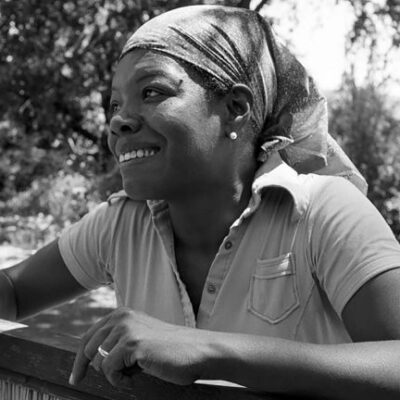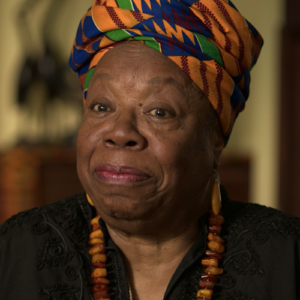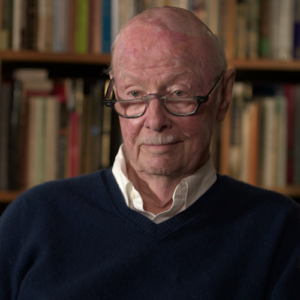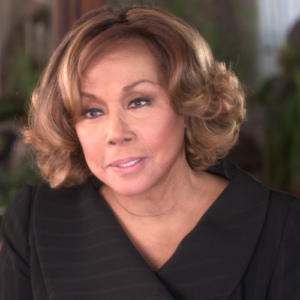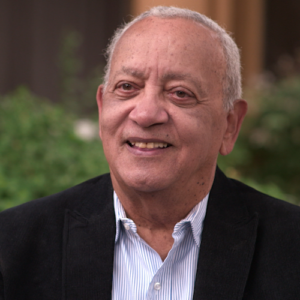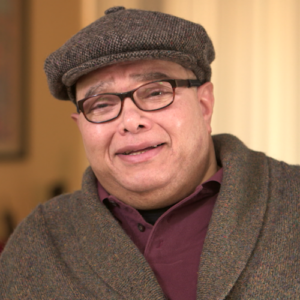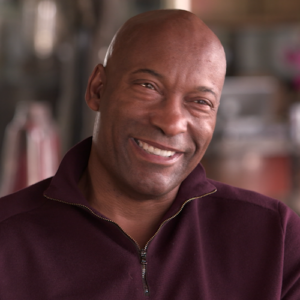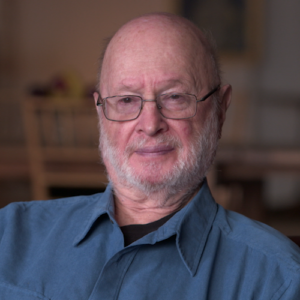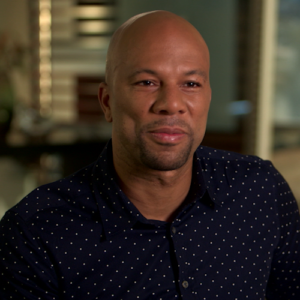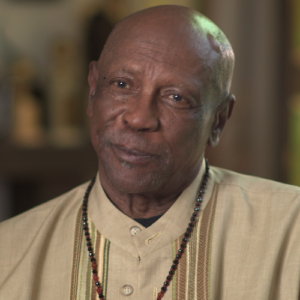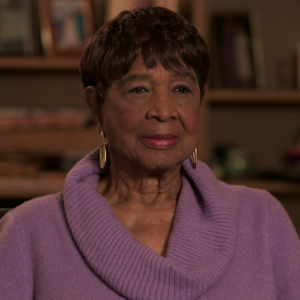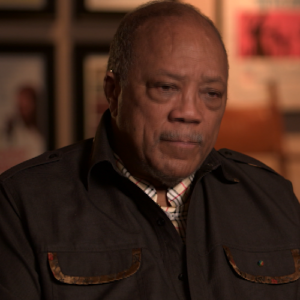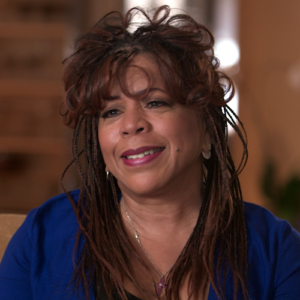Interviewer: I want to jump right in and ask you. When did you first hear about Maya Angelou? Was it in school? Was it books? When did you first hear about her?
Alfre Woodward: I am sure it was. I know why the caged Bird sings. And I’m just saying that because that’s the that’s the thing that I remember impacting my life. You know, I don’t even know what age I was. I have to think about that because it just. It’s so much a part of what I’m imagining was my coming of age as a teenager. And I discovered it in school. I think I had it in a lit class, but. I could have been older. This is a thing. I could have been older, but it touched a very young, girlish part of me. It was. I felt it was me. I felt it was a girl sitting next to me in class. I felt it could have been a girl in my neighborhood. It was the first time I read something that resonated. It was not my experience at all, but it was so familiar. I lived in Tulsa in a very, you know, protected middle class black experience in a thriving community that then during segregation, everybody lived together. So. I was very close to the experience of all kinds of young black girls. And even within my huge family. So. It was. It was as if something was being said that you were never supposed to talk out loud about. Just the fact of our lives not even getting to to the the the robbery that happened to her. But it was it was the first time that I remember. You know, southern black girls being real and and it touching a place in me and and then also just the sense of. Bravery and determination and resilience and possibility. It almost frightened me in a way, because it shook me out of. Out of a safe place that I didn’t know I was existing in, that I out of a safe place that I didn’t know was existing in until I read it. And the other thing and it’s something that carries over to all of Ms.. Maya’s work is. The wonder. We all know the words, but the mastery of putting them all together. The mastery of putting them all together. To say something that is so close to all of us. It’s almost like a mother tongue, but we’ve never been able to put it into words ourselves.
Interviewer: Wonderful. I want to go to a place in 1977, which was the Roots Minutes mini series where Maya Angelou played Kunta Kinte, his grandmother. I’m not sure where you were in your life career at that time, but when Roots came on, it became the mini series of the decade. And Maya Angelou was in that. I don’t know if you remember her in that, but tell me. We just came from Lou Gossett. So what did that mini series mean to you? And did you remember Maya Angelou in.
Alfre Woodward: I’m I’m smiling right now because I laugh. I give Reuben Cannon grief about this because we became friends and work together much later on in the business. But I was in Hollywood at the time. Hollywood didn’t exist, and I’m the only black person over 50 who was not in roots. And so I give him grief about that all the time. But I remember. Again. I remember. Hearing and seeing and feeling something that was so everyday to me, but striking because I never seen it played out on a screen before and. It. It almost makes you feel like, okay, I didn’t dream myself. At that point, the main images that we were getting on the screen were people that I didn’t recognize. I didn’t know any, you know, gangsters or robbers or crackheads or pimps and hos and whatever else that was going on are super flies. I didn’t know. I didn’t know any super men either or women. But roots. It was as if my family was on the television. And I don’t mean my ancestral family, but my real family. It was a representation that that I didn’t know. It was a representation that I didn’t know that I was missing until I til I saw it and. Again when I was young, my father would he would shout, Come on, mothers in Wisconsin. Come on, come on, come on, bring the kids. Bring the kids. And we’d go running in and, you know, look at this CoverGirl on TV. And he just be sitting there looking at it and he would be Leslie Uggams is somebody singing with Mitch Miller? And my mother would stand there, her eyes would fill up and she would green at the TV wash. And of course, you know, just my point occasionally, like, yeah, yeah, I see. Because we didn’t we didn’t know. But I remember my parents calling them immediately, making sure it was like getting us on TV. And so it was just it was a, you know, looking, looking back on it now, see, so, so many years after I look, I haven’t seen it in a while, then I recognize everybody in it. But when I saw it, I believed everybody was who they said they were. I didn’t think, Oh, there’s Ben Vereen. Ooh, there’s Olivia Cole. It was like, no, whoever they said they were, they were to me.
Interviewer: Wonderful. It was very believable. Now, I guess the first time you worked with Dr. Angelo or the first time you met her. Describe that to me, because I’m thinking it was the making of an American quote. It could have been another place. When did you first meet her?
Alfre Woodward: I think I again, you feel like you’ve known her forever because you have taken possession of her even before you saw even before you maybe had that in the flesh encounter. But certainly the first time I ever sat down with her was during the making of How to Make an American Quilt.
Interviewer: How was that? How was the acting Europe observing her, your relationship with her on that set? What was that like?
Alfre Woodward: Well, you know, it’s so interesting. Yes. Because she was at once familiar to me and I was being giving her her proper reverential do and calling her Dr. Angelo. And she would say Afri, you know, stop it. You call me Maya. I looked at her, I said, I’m going to call you my. Okay, let’s let’s compromise. We’ll go with Ms.. Maya. I was like, I call you Maya, and you turn around one day and said, You know what I decided? I won’t call me Maya. But but she was she was definitely a younger sister to her. But she, she she treated me and looked on me as a colleague, you know, a puppy. One that needed some housebreaking. But nonetheless, she recognized me as a fellow artist already in full bloom. And we had we had a fun time together. She is she always has is full of decorum, but she also is bawdy and funny. And it was great. That made me believe everything she said, even more because she was not on a pedestal. She was her feet were firmly barefoot and planted on the earth. And and that made everything that she said even more. Even more golden to me. Something that I knew. I could give in to and and I could. I could embrace and I could. I could have. It would. It would. He referred to me as well I was not outside of. This sort of. Importance. Of any given moment. That’s what she always made me feel like and recognize now is a little bit of a you know, I was kind of a funny kid and, you know, kind of odd and a jokester and all of that. And, you know, I wasn’t like a great Sunday school kid, let’s just put it that way. And and then at one point, I was like, what we used to call it Nippy. I won’t go into all of that. But it was a hippie of color, let’s just put it that way. And and an artist, I thought, you know, but. My generation of kind of artists. We got more casual and there was a certain way of relaxation in the culture that that happened that went across the board in terms of ethnicity and my relationship with Miss Maya. She always made me understand the importance of every moment that I was in. I think, Oh, this is just casual Friday. We just sitting here. And she would always bring you back to looking at it, still enjoying it, but looking at it, knowing that what you were doing was she gave. She gave the reverence to art. And to artists. And having you recognize that you were a Grio, that it was a sacred thing. That it wasn’t just. The kind of psychodrama and just playing some music that society might ascribe to us as if we’re also children.
Interviewer: You know, that’s really important because one of the things that happens here as we’re doing this documentary is people don’t know who she is. They get that reverent part. But because of what you said, is there any any type of story or anything that happened with how to make an American quilt that would let us see her as a person off camera, any any joke, any talk that she may have had with you?
Alfre Woodward: Well, okay, I’ll just. None that I could that I could relate publicly, other than just to say So. It was it was M.I.A. It’s Anne Bancroft, Ellen Burstyn, Lois Smith. Who else was at that table? There was this. There was there were her contemporaries, Caucasian actors, woman actors. And again, with all of them, I felt, okay, I’m sitting here, I better behave. But the conversation. You know, we talked about just in passing about men and about, you know, and all of us loved men. And they would say something a little, you know, a little nightclub ish. And I would catch Olympic. Oh, my God. My Angelo just said that Anne Bancroft gave her five, talking about, you know, some guys, you know, build or things like that. So and it made me feel good because I thought, oh, my God, I’m still going to be like a girl when I grow up. When I hit 60, when I hit 70, I am still going to be. That same. That same. Have that spirit.
Interviewer: Great. Thank you for that. Now, down in the down in the Delta during that filming.
Alfre Woodward: Oh, I have this to tell you as well. Okay. So we would sit at lunch to order. They’d say, Come in and take me orders for lunch and. People were saying things like, Oh, I will have just give me a scoop of tuna and a bit of lettuce. You know what? I’ll just have some give. Give me the salad and put some tomatoes on it. But don’t, don’t give me any. And somebody said, can I just have some turkey slices over some, you know, some peas or something like that. And I was thinking, oh my God. Am I should I have to be ordering this kind of food and eating this way when I’m 60 years old? Because, you know, on camera, you just you have to eat like you’re in training forever. But then it would come to me and I said, I’ll have the steak. And I just Yeah, yeah, that’s that’s what we’re going to do. You know, if this creative genius and this woman with all this was having the beef, so was I. I mean, we’ve learned now is protein. You should have it. But. But, but people have this idea is like, oh, you know, I have to just eat some some quinoa. King was good. But, you know, we have work to do.
Interviewer: Set the context of the times and down in the delta, because a lot of people that hear this and use the title aren’t going to necessarily know it because it’s so many years later. From 1998 when it came out, it was her directorial debut. So if you would just set that up for us.
Alfre Woodward: Okay, So back in the late nineties, I got a call that Dr. Angelou was going to make her directing debut and that she wanted me to play the lead role of Loretta. Loretta is this urban woman who has a lot of sort of demons. She, you know, she loves to drink, she loves to hang out, but she’s a grown woman with children. And so she ends up taking a trip to the south, to her relatives there. That’s her down in the Delta is so and the fact that she wanted me to do it, I think it was because she had seen me capture. Women who are. She knew I was unafraid to to actually be Loretta in in her debauched state and that I could be changed. I had a that I surrender to Southern culture and I think I surrendered to it not only because it is part of my life, but also is because I. I revere it. And so you have to have a love of it to go there. So she wanted to take that trip with me or have me take that trip with her. And so that that felt really great and. There was. It was really about family. And that’s something that was very important to her as as a storyteller and as as a writer. The importance of family, not just that immediate family, the importance of it in your life, whatever they however it manifests itself. But the idea of how we create family, how we create our own sense, if our roots don’t go, if we can’t trace them all the way back for, you know, through dynasties that made our connection with our family even stronger, our roots were more lateral. And so they had to you had to hang strong with them. So that’s that is the story that down in the Delta was was was telling and was with Mary Alice and and Al Freeman Junior and Esther Rolle, Loretta Devine. We had an amazing time. And Wesley Snipes, of course, and was one of our producers as well. And it was interesting. I knew I knew she was a creative genius and genius travels. So I didn’t have any qualms of being directed by a first time director. It was very interesting to watch because she essentially is a poet. She lives a very poetic life and, you know, lyrical, tragic as well. But but certainly epic. But poets tend to be more introspective. Poets create alone. They they they watch us, but their voice comes from a place, from a solitary place. The poet’s voice comes or the observations. And a film set is the absolute opposite. It is just, you know, basically we’re circus people and that’s what a set feels like. And and it’s a synthetic process. Everybody’s coming in, throwing that together. It becomes a story by a single storyteller, but it takes 80 people to do that. And it’s kind of like a like a public school rave. Usually being on a set, you know, it’s it’s loud. It’s it’s boisterous. It’s it can be fun, but it’s all full of drama until action and then cut and it all starts up again. And it was interesting watching her bring to this process, first of all, just on the set. People. Had to get a customer and there’s a lot of of giggling in, oh my God, this kind of thing, because people were unused to having a certain atmosphere on the set. And again. Just as important as the story that we were telling was how we told that story, the process, how we treated ourselves and each other in the process of telling that story. And so she was called Dr. Angelou on the set, and she called people Ms.. Ms.. Divine not just the actress, but the property mistress. Ms.. JACOBS Everybody. And we had to call each other that. And it was, you know, people kind of smiled at first like, oh, my, you know, because again, we’re those people that that, you know, a couple of years ago, we’re those people that a couple hundred years ago didn’t get let into restaurants. I mean, you know, entertainment type people and how it changed everything and how we approached it. Again, understanding the weight and the significance of every moment you’re standing in. And so to be able to tell this story even like a grip, just like a beer, belly grip, who was just kind of doing his job. Took. It became an honor that he was telling, helping tell the story. For him, it became we honored each other and honored this story in so. It was. We still have cut up a lot and had a lot of fun. And you know who cut up the most was Esther Rolle. I’ll tell you about that. But. Again, usually a place where everybody’s spitting and swearing and sweating and just getting it done. She constantly had us understand the historical significance of every scene, so we would sit and talk and and it wasn’t like everybody disappeared. The whole crew would sit and she would talk about the time period of a particular scene and the history of what would be happening in that space. You know, 50 years ago, a hundred years ago, what would happen in that space? That’s me. What would happen in that space 50 years ago or a hundred years ago. So it was it was being in school in a way, but it was like. Life school. Like, if you’re going to come into this moment, you’re here for a reason. And so I’m going to have you walk away with something.
Interviewer: I’m feeling that because there was a story that Ruben told me about someone asked Maya Angelou about the character Mary, and the actress asks, Why does the family have to move from Chicago to Mississippi? And. Maya Angelou responded that the pain that exist outside your door is in the pavement. You have to move, she told another actress. I want you to walk as if there’s a rock in your shoe and you can’t get it out. How did she direct you? What did she say to you? How did she direct you? And when you tell me, tell me what? The Maya Angelou went down in the Delta directed me.
Alfre Woodward: When I was being directed by Maya Angelou and down in the Delta. When I was being directed by my Angelo and down in the Delta. I think what she did with me in particular. Was that she let me go. She entrusted me with the character. She knew I knew how to bring what was needed in a given moment. So what we did was we would talk about people like Loretta. My character. We talk about people like my uncle. We would tell each other stories about people from our lives. So it was really more like as opposed to she telling me something to get a result she needed because that’s why she had me there, is that she knew that I that I would bring that. So what we did was an extension of that relationship I talked about as two artists, and I never felt more like an artist than when I would engage with Miss Maya from the very first time on how to make an American will all the way to visiting her. And in the last, I’m guessing last three years, we had a conversation. About being artists at her home, not being a woman artist in this time. And so. For me. I would. I would say. I would imagine she had me there for. To to bring the character forward, to tell the story, to portray that, like on another level. I think I was there. To keep her company. In making the the statement she wanted to make.
Interviewer: Wonderful. Oh. I want it because you almost went there. I want to stop and just go there. Three years ago, at her home in Winston-Salem. Her telling you about being a woman actress. What was that like? What did she say? What did you talk to her about?
Alfre Woodward: Well, it was a long conversation, but one one of the aspects of it was that. Of recognizing and. And giving your artist self permission and leeway that. That. That you wouldn’t give yourself or need. As a civilian woman. Yes, you could still do your family. You could still do your church and your the world and your social activism commitments and all but that. Because you were. An artist in this time and a woman. There are things that you see and feel that no one else will. It doesn’t mean that you’re special and not the things we think are special in that way. But you are special and you got to give yourself. Some. A lot of loose rein. You got to let the reins loose. And that was the gist of it. I mean, we talk about family all the time when we were together, like children. Our children. My children. Her children raising children are claiming all the children. All of the children. That belongs to all of us. But. She said, You you’ve got to remember that you’re not a regular person and you’re not a regular person and. You’ve got to. Do you have? You got to. Admit that. But you’ve got to live it. You have to step out beyond that. And it might make some people suck their teeth. But that you had to take care of yourself. And I never felt I had license to take care of myself. Never thought of it. But that after that conversation, first of all, it made me feel like, oh, my God, I have not. How much time have I wasted not knowing this? But that quickly dissolved into just a lot more bravery in terms of. What I demand for myself. In the world not. Not stuff. But my license. To be how I feel like being how I am at a moment and not apologizing for it and actually using it as well.
Interviewer: That would sound like her. You know, the story of Down in the Delta seemed to have some parallels with her own.
Alfre Woodward: Oh, let me tell you this part as well. I forgot about this. Thank you. Because going back to down Delta, you know, and the way people did their job, it was like we were on an archeological dig on sacred ground. So you had to just be mindful. But you but knowing that it was sacred ground and it wasn’t just going to be about what was on the surface, what was on the page, how you usually shoot film. I tell stories. It was, no, you are going to have. We’ve got to honor all the bones below what is happening up on the surface here and even say with the properties department, the prop master. It was with everything in that environment because colored people had to. Treat everything they had as if it was China. You know, even if it was some pottery made out of mud, we swept our yards when it was just dirt. That was a kind of order and regard we had. And so having, you know, that prop Nathan, the candelabra. If it wasn’t that the actors behaved a certain way around. Nathan Everybody on the set, the property management, wasn’t it? It was handled a certain way because it was silver and it was expensive, but it was that, no, this is expensive because of the price that’s been paid for it. And so it was just that kind of sensibility with everything that we were doing that that lifted everybody to a different level. I must say at first people were taken aback by it again because we used to call in a guy 40 years our senior bill, Hey Bill, where’s my you know, when you say, no, this isn’t going to happen here. But I was going to tell you this about Esther Rolle. So. So Miss Maya was very she is as demanding on others as she is on herself. She’s very exacting the way she is with her words. And that’s how she how she that’s how she heads up, you know, the how she takes the helm of a ship. And of course, as actors, we were there for sometimes 14 hours and you’re tired, you get it. You start to act like kids misbehaving in Sunday school. And she would clap, you know, come on, let’s stay focused. And you know, who was the one? They were cut up all the time and get us in trouble was Esther, because Esther had her character has dementia in it. So she was going to this childlike place to play this this role. And but she would, you know, she would do things like knock things over in front of us, and they would crash in front of us and she’d go, oh, like that to my And I would go like, Yeah, come, let’s stop that. Ms.. Woodard. Ms.. Devine And it would be Esther the whole time. And we would say, No, no. She goes, I don’t want to go here. And we would laugh. We just we had a good time making that picture. I remember it well.
Interviewer: Well, it it seems to parallel her life and it also resonates with the whole African-American migration to the north and then returning back to the south. Did you get a sense you give us a lot of this, but how would you sum up her feeling about this film as an African American journey? Down in the Delta is a journey.
Alfre Woodward: My angel was filmed down in the Delta. Mirrored the migration of the sharecroppers, the children of the sharecroppers coming up to the north for for opportunity, for safety. And they start to live away from the land. They live on concrete. And that starts to change a person. Especially people who have worked the land. And it starts to make the family dysfunctional after a certain after couple of generations. And that’s what we find our lead family having. And the mother, beautifully played by Mary Alice, realizes, you know what? This is what I’m going to do because Loretta is a grown woman. But she was acting like a petulant teenager all the time. And she has a special needs daughter who is autistic. She has a son that does not have a man figure there with him. And so. She she knows the remedy to that is getting back to the land is going down where people say, Good morning, how are you, sir? I am fine. Where there is community. And that’s what you don’t have. That’s what you lose. Becoming urbanized. You got to fight to create community in an urban environment. And you’ve got to find a way to put your feet on the ground in one little park for thousands of people. So she she sends them back on that journey. And it’s a journey that I think Dr. Angela believed very much in. And the beauty, the the she believed in the beauty and the healing power of the South and of family and connections. And so. Our our protagonist finds herself her sense of self that could not be pulled out of or could not be. It could not be manifest or it could not blossom in an environment where there were not where roots could not go in to up from the. Her sense of self could not blossom up through cement, and she was able to do that when she went into the environment of a family, of roots of being on the land of community.
Interviewer: Tell me so because you mentioned it earlier. You mentioned the candelabra as. Nathan. Just just explain that. So if we use that, people will know that.
Alfre Woodward: Okay, let me see if I can get it straight. In the film, down in the Delta, there is a candelabra that has been passed on for generations from my mother’s family and. My mother when we’re in Chicago, she says, I know that that that means a lot. This candelabra, I don’t know. I can’t really feel it because I’m being all, you know, urban and slick and, you know, running around. But I know that it means so much to my family. My mother takes it to the pawnshop and she gives me the ticket and she says, You’re going to go down south and you are going to you’re going to work. And earn enough money to come back and claim. Our history, our legacy, our family history by coming back and rescuing that the history of the candelabra that we call Nathan, that is the the name of my great great grandfather. I think it was the one. Thing that was earned by blood and sweat and lives and humiliation from a plantation that that Loretta’s ancestors work worked for generations.
Interviewer: One of the things that I wanted to ask you. I’m sorry to have to ask you this, but I need to. Do you remember the moment you heard about her passing earlier this year? And how did you feel about that?
Alfre Woodward: Well, you always feel like. There’s another question. And now I don’t get to ask. And I have been thinking for a year, you know, what I need to go see is my I need to go. And so when I would cross the country, actually a couple of times I tried, maybe I could just pop down there. Maybe I could change my ticket to do this. But there was I didn’t do it. But one of the great things is that I’m. Can you think of my friend’s name? One of the great things is that I’m good friends with how Frederick and how has been a dear friend Miss Meyers, for years. And he’s somebody that you might want to talk to, but. He said to me that just on a lark he had decided he was going to see her over Mother’s Day. And so that was like a couple of weeks before she left. And he said they had the best weekend. She was cooking. They were laughing and drinking and having telling stories. And that made me feel so good that you know that. That’s what she was doing two weeks before she left. I love to read, and there are some authors that when I read their book, you know, I just get so excited and I just, you know, like burrow down into it. And about two thirds of the way through. I get, I start to feel depressed because I know it’s going to be over soon. Although you’re getting to the good climactic part and you just can’t write another book, you got to wait for that writer to to live some and to come up with it and work on getting it out. And so. With somebody like Maya Angelou. That’s the thing is that. All of us have different fingerprints, but none of our fingerprints are so indelible on the lives of other people when they touch us. It’s like Ms.. Miers gone. And that’s that. Because nobody is going to talk like she talked. I walked like she walked. So, I mean, she left us plenty of things. We can be greedy, but man. The curtain going down on that act. You just say, Thank God I got to live in that time. For weeks we had set. You know, chicken, beef, pork. And I don’t really eat meat in the middle of the day, especially in the summer when you’re working. And so I decided, you know what? I am going to have some fish go, had a trailer and I made my lunch every day because you also can’t eat the catered stuff because you just get bloated. I said, I am going to make some fish because I didn’t have to go to sit for, you know, several hours. I didn’t have my seat. So I cooked some fish in my on the stove, in my trailer. And so I got really paranoid, kept saying because she said to me, she said, oh, if you know, if, if I’m around fish, my throat swell up and I know I have to go to the hospital. But I said, you know what? I’m going to cook some fish and then I will just clean up and I’ll. Well, her assistant walked by when the fish was cooking. I said, What are you cooking? It smells good. I said, Nothing, and I’m not getting anything. Now Momma is up on set and I ate that fish. I wash my hands to the point that they were wrinkled and then I brush my teeth is like, there can’t be any fish on me because I think if I go to sit and miss my passes out, what am I going to do if I. But I did. My hands were raw from me, scrubbing my hands after eating that fish. Of course, she was perfectly fine that day because. But I didn’t you know, I didn’t hug. I didn’t get nothing. I had a bath before I got next to her again.
Interviewer: What do you think her legacy will be with all the civil rights, the acting, the the poetry, the directing? What do you think it’ll be?
Alfre Woodward: I think her legacy will be. Day after day, year after year in all parts of the world. Individual girls sitting down and opening a book and feeling like they’re breathing for the first time, like they let somebody put words to. To the things that they are seeing, living and feeling.

